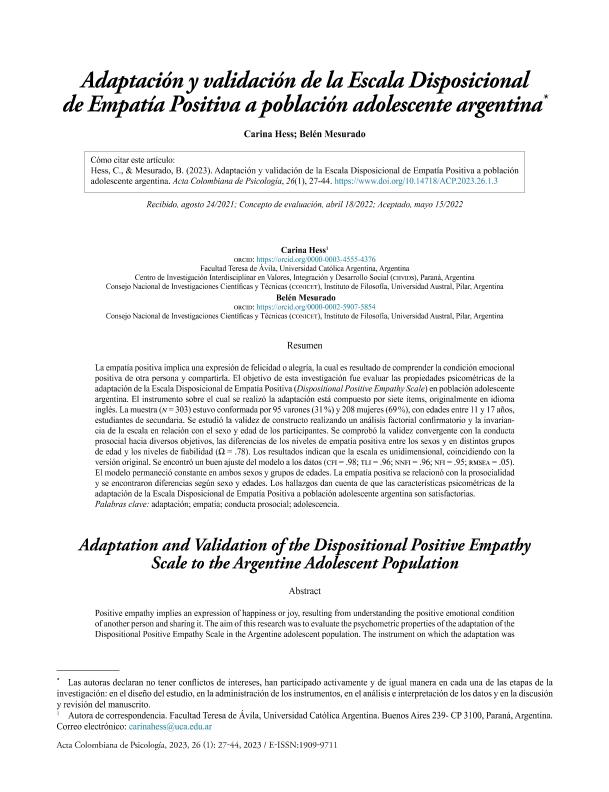Artículo
El estudio de la confianza interpersonal es crucial para el desarrollo psicosocial humano. Se ha observado que, durantela niñez, favorece el comportamiento moral y prosocial, los vínculos de amistad, la competencia social, la experienciade emociones positivas y el rendimiento académico, entre otros aspectos. El presente trabajo tuvo por objetivo adaptar yvalidar la Cross Cultural Children Trust Beliefs Scale (ccctbs), a fin de poder evaluar este constructo en población argentina. La muestra incluyó 348 niños (51.2% mujeres; 48.8% varones), de entre 8 y 12 años de edad (m = 10.58; de = 1.31),quienes completaron la ccctbs y una escala de apego. Se consiguió una versión conceptual y semánticamente equivalentea la original, con buenas propiedades psicométricas. La escala argentina conserva el mismo número de ítems y replica elmodelo operacional de partida, constituido por tres bases principales de la confianza: fiabilidad (α = .76; ω = .80), confianzaemocional (α = .72; ω = .78) y honestidad (α = .78; ω = .83). Las puntuaciones de la ccctbs correlacionaron positiva ysignificativamente con la medida de apego seguro, lo que aporta evidencias de su validez nomológica. Positive empathy implies an expression of happiness or joy, resulting from understanding the positive emotional condition of another person and sharing it. The aim of this research was to evaluate the psychometric properties of the adaptation of the Dispositional Positive Empathy Scale in the Argentine adolescent population. The instrument on which the adaptation wasmade consists of seven items, originally in English. The sample (n = 303) was made up of 95 males (31 %) and 208 females (69 %), aged between 11 and 17 years old, high school students. Construct validity was studied by performing a confirmatory factor analysis and the invariance of the scale in relation to the sex and age of the participants. Convergent validity was verified with prosocial behavior towards various goals, differences in levels of positive empathy between sexes and across different age groups, and reliability levels (Ω = .78) were tested. The results indicate that the scale is one-dimensional, coinciding with the original version. A good fit of the model to the data was found (cfi = .98; tli = .96; nnfi = .96; nfi = .95; rmsea = .05). The model remained constant across both sexes and age groups. Positive empathy was related to prosociality and differences were found according to sex and age. The findings show that the psychometric characteristics of the adaptation of the Positive Empathy Dispositional Scale to the Argentine adolescent population are satisfactory.
Adaptación y validación argentina de la Cross Cultural Children Trust Beliefs Scale
Título:
Adaptation and Validation of the Dispositional Positive Empathy Scale to the Argentine Adolescent Population
Fecha de publicación:
12/2022
Editorial:
Universidad Católica de Colombia
Revista:
Acta Colombiana de Psicología
ISSN:
0123-9155
e-ISSN:
1909-9711
Idioma:
Español
Tipo de recurso:
Artículo publicado
Clasificación temática:
Resumen
Archivos asociados
Licencia
Identificadores
Colecciones
Articulos(SEDE CENTRAL)
Articulos de SEDE CENTRAL
Articulos de SEDE CENTRAL
Citación
Hess, Carina Daniela; Mesurado, Maria Belen; Adaptación y validación argentina de la Cross Cultural Children Trust Beliefs Scale; Universidad Católica de Colombia; Acta Colombiana de Psicología; 26; 1; 12-2022; 27-44
Compartir




